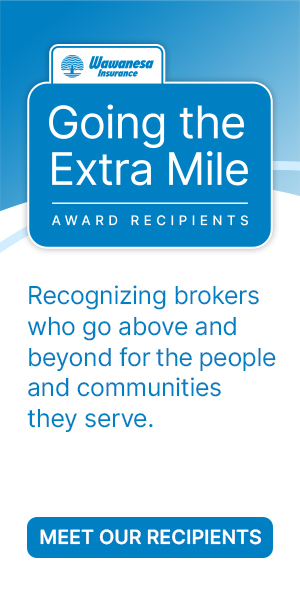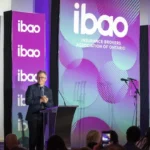December 22, 2023
Digital Working With Quandri
By Norah Black, VP Marketing & Communications, IBAO
Photos by Ashley Drody
It’s a curious time in the world of AI. It’s captivated the conference circuit, dominated media and exploded in mainstream use while introducing efficiencies experts predicted would take decades to happen. It’s also raised alarm from the godfather of AI, Geoffrey Hinton, and the Board of OpenAI, the research lab behind ChatGPT that fired, then reinstated their CEO, potentially over the dangers AI presents.
It’s creating a widening divide between utopian and dystopian views, which is where the conversation starts with Jackson and Jamieson Fregeau, co-founders of Quandri—an AI and automation firm and IBAO’s Innovator of the Year.
“AI augments people by allowing them to work on what they do best, which is not the work that machines should be doing. That’s the utopian view,” says Jackson. “The dystopian view is we create AI that takes the human aspect out of everything. But we have a lot of highly intelligent people making sure AI is helping humans, not replacing them.”
Admittedly biased, Jackson sees first-hand what automation does for businesses.
“It can be an unbelievably positive outcome for people. With any technology evolution, there are downsides. We’ll certainly lose things with AI, just like we lost things with the invention of televisions and computers. There’s always a trade off, but what you stand to gain is so much greater than what you lose. In the case of advanced AI, it means people can focus their time and resources on the things they’re uniquely good at and can do a lot more of.”
Quandri launched in 2021 with the goal of helping businesses automate their largest, most repetitive processes to save time and money. They saw an opportunity to bring AI-powered robots to companies lacking technical teams and deep pockets. While initially working in multiple industries, they decided to focus on insurance after they realized how impactful this technology could be for brokerages.
“It was so shocking the manual processing required,” says Jamieson. “The repetitive work that happens on a daily basis at a brokerage. It’s staggering.”
Quandri currently delivers automation in three areas—renewal reviews, document management and download suspense matching. Brokerages can configure robots to fit their processes, and bots are put into production after two weeks to three months of training.
“Right now, a customer deploys a different robot for each task. If you want it to manage renewals, you deploy that robot. If you want it to handle downloads, you deploy that robot,” says Jamieson. “But we’re shifting to a model where there will be a single insurance trained robot where a customer can add a la carte capabilities on demand. This way you can choose how you want your robotic workforce to match your evolving business needs.”
Of their 70 customers, approximately half in Ontario, the biggest return for brokerages is automating their renewal process.
“The software looks at all the policies associated with that renewal. Premiums, coverages, limits, deductibles, discounts, rating information,” says Jackson. “It gathers underwriting information, which informs the insights and recommendations it provides back to the broker. It highlights major changes from the previous year, gaps in coverage, risks of churn, E&O exposure, upsell and cross-sell opportunities. It’s extremely valuable for brokerages—people can focus on their clients, building relationships and generating revenue.”
“Our other capabilities become more valuable with more volume,” says Jamieson. “Tasks that might take half an hour at a smaller brokerage, take up entire days of teams at larger ones. That’s typically where you want to apply AI and automation—large, high-volume processes where you can get significant return on investment.
“We talk to a lot of the people running the processes our robots build. Something that comes up is the fear of process work going away. But the thing is, those people are very good at their jobs, with a keen attention to detail. These are valuable skills that are wasted on processes software can run. There’s incredibly valuable work elsewhere that requires this skillset.”
“Those types of administrative roles don’t go away, they just shift,” adds Jackson. “When we automate a large process at a brokerage, we automate a component of it, but not a hundred percent. There’s a lot of nuance and complexity, and in most cases you still need a person for the last ten percent.”
Getting into robots wasn’t the dream. But Jackson and Jamieson’s paths seem fated to start a business wildly helpful to other businesses.
“Technology entrepreneurship was always something I was interested in, which I forgot when I went to university for electrical engineering. My co-op was this little startup, building autonomous boats where I worked on the electrical side but was one of the first to go down into the ocean and essentially replace a 20-person crude vessel to do the same scientific research. I looked at the boat’s electrical system and software and mechanical systems. When the co-op finished, I realized I didn’t really like electrical work, I really liked software. And I didn’t really like school, I liked work that made an impact.”
Jackson adds that his brother’s other motivating factor was not wanting to work for somebody else.
“Similar to Jamieson, I was always really interested in entrepreneurship. It’s a permissionless way to have a large impact early on. You don’t need permission to start a company. You don’t need to be promoted. You don’t need X years in the industry or the right connections to get the job. The results you drive, the business you build, the product you deliver are based on what you and your team do yourselves. The ceiling is infinite.”


After graduating from business school, Jackson joined an early startup, essentially as the EA to the Founder. “I wasn’t getting him coffee, but I went with him to get coffee.”
He started out doing different operational work: invoicing, building processes, hiring, creating financial models. He started managing customers and became COO after a few years.
“It was a great opportunity to learn how to build a company from the ground up. I had a great mentor who really showed me what was possible. It was actually an issue that came up there that led us to Quandri. I was managing an operations team doing a lot of high volume, repetitive data entry work. We couldn’t read or write what we wanted into the application, so I looked at bots to solve the problem. The technology was booming at the time, and we saw the opportunity to build something meaningful in the space.”
Jackson learned the tech himself, built a few bots and was blown away by the value they produced.
“There wasn’t really anybody doing this type of work at the time, outside of serving Fortune 500 companies. Jamieson and I saw the opportunity to bring robots-as-a-service more broadly to companies in Canada.”
They started in a few different industries before focusing solely on insurance brokerages, which is what they’ve been doing the last two and a half years.
“Yeah, it’s been a crash course on insurance and insurance brokering. But we’ve learned a lot and have had some amazing industry people help us get to where we are today. Our customers who’ve been with us from early on, who worked with very early versions of the technology when it worked less predictably than it should have—they stuck with us to help us build this, and all of that has really allowed us to get where we are today.”
“What was most surprising was hearing that it’s a hard industry to work with, that brokers don’t want to invest in technology. Even from brokerages themselves, there was a perception that there’s a lack of desire to invest in moving things forward. But I’ve found that completely untrue. There’s a massive appetite to make work better for the people working in this industry. That’s one reason behind some of the success we’ve seen so far—that desire is really strong. We’ve been able to, in a small way, satisfy a piece of that desire for change.”
“The pandemic pushed a lot of that,” adds Jamieson. “It helped move businesses toward tech. And more young people have become involved. People who are technologically savvy are getting greater responsibility within brokerages because those businesses need the tech, I think both of which have made brokers more geared to adopt technology since we started this business.”
“And if you look at the last 10 years,” says Jackson, “that’s when tech companies became the biggest companies in the world. Over that period of time, technology has become pervasive everywhere. In your personal life, in your work life. It’s when technology has also become kind of scary. People are worried about being left behind. So I think these larger trends are also forcing people’s hands.”
Whether it’s a strong desire for change or macro trends, the growth Quandri’s seen in such a short time is impressive. They were awarded Innovation of the Year last October and have continued to grow their product, team and customer base, seeing almost 8x growth over 2023.
“The award solidified the impact we’re having on this industry,” says Jackson. “It was a phenomenal recognition of all the work we put in. We’re helping our customers, we’re helping the industry, we’re helping improve organizations, which is our goal in all of this.”
“It was also a significant milestone to show how much the industry needed what we were doing,” says Jamieson. “We won the award within the first year of focusing on insurance. If we started building these solutions and delivering this product, and within a short time were recognized as Innovation of the Year, I think that speaks to how much the industry needs our type of solution.”
“This technology is extremely helpful for brokerages,” says Jackson. “It’s not this new leading-edge tech anymore—the largest brokerages in the country are using it. And that’s the thing with technology. If you don’t adopt it, your competitors will, and you’ll be slower and less efficient. So in the interest of good business, this tech can really help drive efficiencies. Progress isn’t something you can put the lid back on. It’s our job to figure out how to properly leverage technology for the benefit of society and humanity.”
That’s the thing with technology—it doesn’t stop. So here’s to getting on board.






